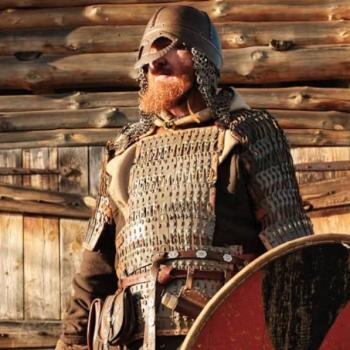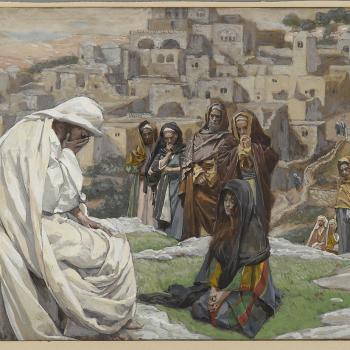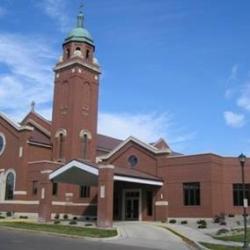
St. Paul was the great apostle to the Gentiles. He didn’t require circumcision of his converts. That’s something I can easily appreciate, but I found I needed more work to understand it. What was Paul’s vision of God’s chosen people. Episode 16-2 of the Rowing with Michael Series: A journey through the Jewish/Christian Scriptures in Verse and Commentary. Introduction and Contents for this series HERE.
The Jews knew something about why God chose them. It’s in God’s promise to Abraham:
In your seed all the communities of earth shall find blessing. (Genesis 12:2-3)
But they didn’t believe that should be happening yet—not while Judah was subject to a foreign power. They expected the nations to be blessed through them, and they meant through a restored and renewed and finally faithful Israel, like dead bones come to life in Ezekiel’s vision. They had visions of foreigners streaming into a mighty and prosperous Jerusalem to worship in their temple.
Part One of this Chosen People episode saw Jonah upset with God. He had committed himself to this vision, and God apparently hadn’t. God could bless the Ninevites without their having to come anywhere near Jerusalem.
Paul, Peter, and eating with Gentiles
Here’s the same issue as the early followers of Jesus experienced it:
In the years after Jesus’ death a group grew within Judaism with some new beliefs. There was nothing unusual about that, but this one was quite a bit more open to non-Jews than any Israel had seen before. There were people like Paul going out and actively encouraging Gentiles to join the new community. Soon the very identity of the group was at stake. Should the foreigners have to accept the provisions of the Jewish law, the Torah, especially the law about circumcision?
Paul had been preaching a non-circumcision gospel—Gentiles could be followers of Jesus without becoming Jews. He was working without the knowledge or approval of the “pillars” of the Church in Jerusalem, mainly Peter and James. So fourteen years or so after he started this ministry Paul and his Gentile coworker Barnabas went to Jerusalem to explain themselves. The “pillars” agreed to let Paul and Barnabas carry on with their message to the Gentiles while they ministered to the Jews.
Peter, who had given “the right hand of fellowship” to Paul and Barnabas at this meeting, some time later found himself enjoying “table fellowship,” with Paul’s Gentile converts in Galatia. The significance of mealtime goes way back in Jewish history and in memories of Jesus’ life and death. People from James, the head of the church in Jerusalem, came with some message that Peter perhaps misunderstood. He had been having second thoughts about this new gospel of Paul’s anyway. Now suddenly he withdrew from the table fellowship with the Gentiles. In a further shock to Paul, a wavering Barnabas followed Peter. (It’s not known whether Barnabas went through with circumcision.)
Paul laid into Peter on the spot, calling him a hypocrite; but the issue wasn’t settled in the minds of the Galatians yet. After Paul left Galatia others from Jerusalem continued to insist on circumcision and following the whole Jewish law. The Christian Bible preseerves Paul’s answer as the “Letter to the Galatians.” You can tell Paul gets pretty worked up about this. Eventually Paul’s view won out.
The real issue about chosen people
As a Christian learning about this argument 2000 years later, I always knew which side I was rooting for. But that doesn’t mean I knew what the fight was all about. I assumed that Paul wanted to make it easier for more people to join the new church. Victor Stendahl, in Paul Among Jews and Gentiles, helped me see better. Paul was concerned about a very different problem. Among the religiously excitable Greeks and Romans, many were enjoying the strange oriental feel of this new religion with exotic new practices. The harder the holier, they thought.
Paul warned his Galatian converts that the Jewish law would be a curse for them. It seems a strange statement coming from a strict observer of that law, which Paul was. But Paul knew well, from the example of some of the Pharisees and, especially, the wealthier Sadducees, how the law could separate people from each other, the “holier than thou’s” from the rest. He also saw what he had been doing in his own misguided zeal for the law, namely, persecuting the followers of Jesus.
Paul’s lesson was that God wants to be the God of all people, but not by making them all the same. Jews always believed the first part. The story of the blessing of Abraham shows God’s intention to bless all peoples. But they didn’t understand the second part. When Peter wanted to force the Jewish law on the gentiles, he was not just limiting who could join the Jesus movement. In Paul’s view he was limiting God’s reign. Peter wanted to enlarge God’s tribe but still keep it a tribe.
Curiously, God did choose a tribe of Jews. And then Paul says to the Galatians, “Don’t follow the Jewish law, at least not the part that divides people.” Christians have said that they are the new Israel, the new chosen ones. That can’t mean we have a new and better law, a new way of dividing people. Only lately have we realized—officially in Catholicism since the Second Vatican Council—that God’s covenant with the Jewish people, our older brothers and sisters, is still active.
I think it’s fair to say that both Jews and Christians are God’s chosen people. I think the Catholic Church’s claim to be the “one true church” is best understood as another way of saying “chosen.” It certainly doesn’t mean we have all the truth—we’re still learning. It doesn’t mean having an inside track on the race to heaven.
God has a reason for coming in a special way to the rest of the world through a chosen group, Catholics or Christians or Jews. That reason, or my attempts to glimpse it anyway, is the subject of the next post in this reflection on Jonah, Ezekiel, Paul, and chosen people.











